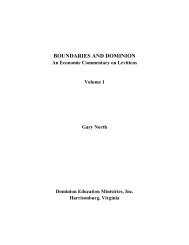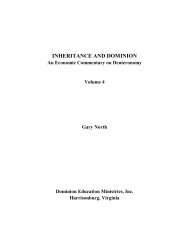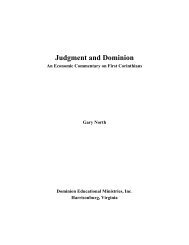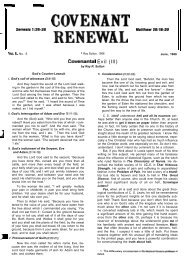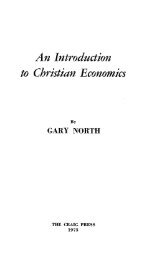- Page 1: IS THE WORLDRUNNING DOWN?
- Page 9 and 10: PREFACEBut ifthere be no resurrecti
- Page 11 and 12: PrefaceXltrines: the six-day creati
- Page 13 and 14: PrefaceXUllimiting themselves to ho
- Page 15 and 16: Prefaceshown why and how six-day cr
- Page 17 and 18: PrefaceXVllman's relationship with
- Page 19 and 20: PrefaceXIXthe face of triumphant Da
- Page 21 and 22: Prefacerelationship to man and God
- Page 23 and 24: PrefaceXXlllgarden. God cursed Adam
- Page 25 and 26: Prefacexxving out. You are steadily
- Page 27 and 28: PrefaceXXVllguilty just because the
- Page 29 and 30: PrefaceXXIXof utopias. You are requ
- Page 31 and 32: PrefaceXXXICaribbean islands, new B
- Page 33 and 34: PrefaceXXXlllThis approach is based
- Page 36 and 37: The purpose of Biblical history is
- Page 40 and 41: 4 IS THE WORLD RUNNING DOWN?stood a
- Page 42 and 43: 6 IS THE WORLD RUNNING DOWN?at the
- Page 44 and 45: 8 IS THE WORLD RUNNING DOWN?concern
- Page 46 and 47: 10 IS THE WORLD RUNNING DOWN?Always
- Page 48 and 49: 12 IS THE WORLD RUNNING DOWN?Conclu
- Page 50 and 51: 14 IS THE WORLD RUNNING DOWN?Man's
- Page 52 and 53: 16 IS THE WORLD RUNNING DOWN?The mo
- Page 54 and 55: 18 IS THE WORLD RUNNING DOWN?conclu
- Page 56 and 57: 20 IS THE WORLD RUNNING DOWN?Twenti
- Page 58 and 59: 22 IS THE WORLD RUNNING DOWN?But th
- Page 60 and 61: 24 IS THE WORLD RUNNING DOWN?Accord
- Page 62 and 63: 26 IS THE WORLD RUNNING DOWN?In 197
- Page 64 and 65: 28 IS THE WORLD RUNNING DOWN?Place
- Page 66 and 67: 30 IS THE WORLD RUNNING DOWN?traces
- Page 68 and 69: 32 IS THE WORLD RUNNING DOWN?realm
- Page 70 and 71: 34 IS THE WORLD RUNNING DOWN?ways:
- Page 72 and 73: 36 IS THE WORLD RUNNING DOWN?Laws o
- Page 74 and 75: 38 IS THE WORLD RUNNING DOWN?geneti
- Page 76 and 77: 2THE PESSIMISM OF THE SCIENTISTSPhy
- Page 78 and 79: 42 IS THE WORLD RUNNING DOWN?What d
- Page 80 and 81: 44 IS THE WORLD RUNNING DOWN?niques
- Page 82 and 83: 46 IS THE WORLD RUNNING DOWN?contin
- Page 84 and 85: 48 IS THE WORLD RUNNING DOWN?he see
- Page 86 and 87: 50 IS THE WORLD RUNNING DOWN?organi
- Page 88 and 89:
52 IS THE WORLD RUNNING DOWN?The He
- Page 90 and 91:
54 IS THE WORLD RUNNING DOWN?matter
- Page 92 and 93:
56 IS THE WORLD RUNNING DOWN?light
- Page 94 and 95:
58 IS THE WORLD RUNNING DOWN?fluctu
- Page 96 and 97:
60 IS THE WORLD RUNNING DOWN?For th
- Page 98 and 99:
62 IS THE WORLD RUNNING DOWN?Humani
- Page 100 and 101:
64 IS THE WORLD RUNNING DOWN?tainly
- Page 102 and 103:
66 IS THE WORLD RUNNING DOWN?as mos
- Page 104 and 105:
68 IS THE WORLD RUNNING DOWN?eschat
- Page 106 and 107:
70 IS THE WORLD RUNNING DOWN?The de
- Page 108 and 109:
72 IS THE WORLD RUNNING DOWN?esis,
- Page 110 and 111:
74 IS THE WORLD RUNNING DOWN?but mo
- Page 112 and 113:
76 IS THE WORLD RUNNING DOWN?their
- Page 114 and 115:
78 IS THE WORLD RUNNING DOWN?The re
- Page 116 and 117:
80 IS THE WORLD RUNNING DOWN?These
- Page 118 and 119:
82 IS THE WORLD RUNNING DOWN?the mo
- Page 120 and 121:
84 IS THE WORLD RUNNING DOWN?It is
- Page 122 and 123:
86 IS THE WORLD RUNNING DOWN?growth
- Page 124 and 125:
88 IS THE WORLD RUNNING DOWN?tal, t
- Page 126 and 127:
90 IS THE WORLD RUNNING DOWN?25. Ri
- Page 128 and 129:
92 IS THE WORLD RUNNING DOWN?self-p
- Page 130 and 131:
94 IS THE WORLD RUNNING DOWN?Is Man
- Page 132 and 133:
96 IS THE WORLD RUNNING DOWN?energy
- Page 134 and 135:
98 IS THE WORLD RUNNING DOWN?noonda
- Page 136 and 137:
100 IS THE WORLD RUNNING DOWN?But i
- Page 138 and 139:
102 IS THE WORLD RUNNING DOWN?cess.
- Page 140 and 141:
5CHRISTIANITY VS. SOCIAL ENTROPYMan
- Page 142 and 143:
106 IS THE WORLD RUNNING DOWN?accep
- Page 144 and 145:
108 IS THE WORLD RUNNING DOWN?hope.
- Page 146 and 147:
110 IS THE WORLD RUNNING DOWN?matte
- Page 148 and 149:
112 IS THE WORLD RUNNING DOWN?explo
- Page 150 and 151:
114 IS THE WORLD RUNNING DOWN?towar
- Page 152 and 153:
116 IS THE WORLD RUNNING DOWN?12. H
- Page 154 and 155:
118 IS THE WORLD RUNNING DOWN?natur
- Page 156 and 157:
120 IS THE WORLD RUNNING DOWN?legit
- Page 158 and 159:
122 IS THE WORLD RUNNING DOWN?The C
- Page 160 and 161:
124 IS THE WORLD RUNNING DOWN?the p
- Page 162 and 163:
126 IS THE WORLD RUNNING DOWN?did t
- Page 164 and 165:
128 IS THE WORLD RUNNING DOWN?tioni
- Page 166 and 167:
130 IS THE WORLD RUNNING DOWN?14. C
- Page 168 and 169:
132 IS THE WORLD RUNNING DOWN?alone
- Page 170 and 171:
134 IS THE WORLD RUNNING DOWN?- the
- Page 172 and 173:
136 IS THE WORLD RUNNING DOWN?he wa
- Page 174 and 175:
138 IS THE WORLD RUNNING DOWN?like
- Page 176 and 177:
140 IS THE WORLD RUNNING DOWN?thous
- Page 178 and 179:
142 IS THE WORLD RUNNING DOWN?A few
- Page 180 and 181:
144 IS THE WORLD RUNNING DOWN?10. R
- Page 182 and 183:
146 IS THE WORLD RUNNING DOWN?prese
- Page 184 and 185:
148 IS THE WORLD RUNNING DOWN?God's
- Page 186 and 187:
150 IS THE WORLD RUNNING DOWN?Chris
- Page 188 and 189:
152 IS THE WORLD RUNNING DOWN?Histo
- Page 190 and 191:
154 IS THE WORLD RUNNING DOWN?This
- Page 192 and 193:
156 IS THE WORLD RUNNING DOWN?ble,
- Page 194 and 195:
158 IS THE WORLD RUNNING DOWN?has t
- Page 196 and 197:
160 IS THE WORLD RUNNING DOWN?its m
- Page 198 and 199:
162 IS THE WORLD RUNNING DOWN?13. C
- Page 200 and 201:
164 IS THE WORLD RUNNING DOWN?world
- Page 202 and 203:
166 IS THE WORLD RUNNING DOWN?He th
- Page 204 and 205:
168 IS THE WORLD RUNNING DOWN?plica
- Page 206 and 207:
170 IS THE WORLD RUNNING DOWN?"natu
- Page 208 and 209:
172 IS THE WORLD RUNNING DOWN?state
- Page 210 and 211:
174 IS THE WORLD RUNNING DOWN?20. D
- Page 212 and 213:
176 IS THE WORLD RUNNING DOWN?Van T
- Page 214 and 215:
178 IS THE WORLD RUNNING DOWN?super
- Page 216 and 217:
180 IS THE WORLD RUNNING DOWN?Rifki
- Page 218 and 219:
182 IS THE WORLD RUNNING DOWN?The W
- Page 220 and 221:
184 IS THE WORLD RUNNING DOWN?our p
- Page 222 and 223:
186 IS THE WORLD RUNNING DOWN?Final
- Page 224 and 225:
188 IS THE WORLD RUNNING DOWN?trine
- Page 226 and 227:
190 IS THE WORLD RUNNING DOWN?lines
- Page 228 and 229:
192 IS THE WORLD RUNNING DOWN?unive
- Page 230 and 231:
194 IS THE WORLD RUNNING DOWN?cosmo
- Page 232 and 233:
196 IS THE WORLD RUNNING DOWN?Rates
- Page 234 and 235:
198 IS THE WORLD RUNNING DOWN?Darwi
- Page 236 and 237:
200 IS THE WORLD RUNNING DOWN?erate
- Page 238 and 239:
202 IS THE WORLD RUNNING DOWN?not a
- Page 240 and 241:
204 IS THE WORLD RUNNING DOWN?the f
- Page 242 and 243:
Appendix BTHE END OF ILLUSIONS:"CRE
- Page 244 and 245:
208 IS THE WORLD RUNNING DOWN?premi
- Page 246 and 247:
210 IS THE WORLD RUNNING DOWN?for "
- Page 248 and 249:
212 IS THE WORLD RUNNING DOWN?major
- Page 250 and 251:
214 IS THE WORLD RUNNING DOWN?Chris
- Page 252 and 253:
216 IS THE WORLD RUNNING DOWN?quest
- Page 254 and 255:
218 IS THE WORLD RUNNING DOWN?is an
- Page 256 and 257:
220 IS THE WORLD RUNNING DOWN?of th
- Page 258 and 259:
222 IS THE WORLD RUNNING DOWN?God.
- Page 260 and 261:
224 IS THE WORLD RUNNING DOWN?chose
- Page 262 and 263:
226 IS THE WORLD RUNNING DOWN?nant
- Page 264 and 265:
228 IS THE WORLD RUNNING DOWN?uncon
- Page 266 and 267:
230 IS THE WORLD RUNNING DOWN?ties
- Page 268 and 269:
232 IS THE WORLD RUNNING DOWN?ways,
- Page 270 and 271:
234 IS THE WORLD RUNNING DOWN?Secon
- Page 272 and 273:
236 IS THE WORLD RUNNING DOWN?have
- Page 274 and 275:
238 IS THE WORLD RUNNING DOWN?Whose
- Page 276 and 277:
240 IS THE WORLD RUNNING DOWN?Tie u
- Page 278 and 279:
242 IS THE WORLD RUNNING DOWN?ratio
- Page 280 and 281:
244 IS THE WORLD RUNNING DOWN?openl
- Page 282 and 283:
246 IS THE WORLD RUNNING DOWN?The m
- Page 284 and 285:
248 IS THE WORLD RUNNING DOWN?nal d
- Page 286 and 287:
250 IS THE WORLD RUNNING DOWN?Istln
- Page 288 and 289:
252 IS THE WORLD RUNNING DOWN?The S
- Page 290 and 291:
254 IS THE WORLD RUNNING DOWN?more
- Page 292 and 293:
256 IS THE WORLD RUNNING DOWN?old s
- Page 294 and 295:
258 IS THE WORLD RUNNING DOWN?Dave
- Page 296 and 297:
260 IS THE WORLD RUNNING DOWN?polis
- Page 298 and 299:
262 IS THE WORLD RUNNING DOWN?tape
- Page 300 and 301:
264 IS THE WORLD RUNNING DOWN?Dispe
- Page 302 and 303:
266 IS THE WORLD RUNNING DOWN?does
- Page 304 and 305:
268 IS THE WORLD RUNNING DOWN?havin
- Page 306 and 307:
270 IS THE WORLD RUNNING DOWN?made
- Page 308 and 309:
272 IS THE WORLD RUNNING DOWN?Rushd
- Page 310 and 311:
274 IS THE WORLD RUNNING DOWN?What
- Page 312 and 313:
276 IS THE WORLD RUNNING DOWN?worry
- Page 314 and 315:
278 IS THE WORLD RUNNING DOWN?How d
- Page 316 and 317:
280 IS THE WORLD RUNNING DOWN?domin
- Page 318 and 319:
282 IS THE WORLD RUNNING DOWN?Many
- Page 320 and 321:
284 IS THE WORLD RUNNING DOWN?Rushd
- Page 322 and 323:
286 IS THE WORLD RUNNING DOWN?Kingd
- Page 324 and 325:
288 IS THE WORLD RUNNING DOWN?of hi
- Page 326 and 327:
290 IS THE WORLD RUNNING DOWN?myste
- Page 328 and 329:
292 IS THE WORLD RUNNING DOWN?of do
- Page 330 and 331:
294 IS THE WORLD RUNNING DOWN?"colo
- Page 332 and 333:
296 IS THE WORLD RUNNING DOWN?Scofi
- Page 334 and 335:
298 IS THE WORLD RUNNING DOWN?to fl
- Page 336 and 337:
300 IS THE WORLD RUNNING DOWN?was c
- Page 338 and 339:
302 IS THE WORLD RUNNING DOWN?man-m
- Page 340 and 341:
304 IS THE WORLD RUNNING DOWN?insid
- Page 342 and 343:
306 IS THE WORLD RUNNING DOWN?histo
- Page 344 and 345:
308 IS THE WORLD RUNNING DOWN?nounc
- Page 346 and 347:
310 IS THE WORLD RUNNING DOWN?What
- Page 348 and 349:
312 IS THE WORLD RUNNING DOWN?the p
- Page 350 and 351:
314 IS THE WORLD RUNNING DOWN?produ
- Page 352 and 353:
316 IS THE WORLD RUNNING DOWN?effor
- Page 354 and 355:
318 IS THE WORLD RUNNING DOWN?troll
- Page 356 and 357:
320 IS THE WORLD RUNNING DOWN?tion.
- Page 358 and 359:
322 IS THE WORLI> RUNNING DOWN?ferr
- Page 360 and 361:
324 IS THE WORLD RUNNING DOWN?This
- Page 362 and 363:
326 IS THE WORLD RUNNING DOWN?Isaia
- Page 365 and 366:
INDEXAbbey, Edward, 160abortion, 23
- Page 367 and 368:
Index 331contracting universe, 53-5
- Page 369 and 370:
Index 333guilt &, 99redirected, 1-2
- Page 371 and 372:
Index 335Goldman, Marshall, 92gospe
- Page 373 and 374:
Index337liberty, 113lifecommunity o
- Page 375 and 376:
Index 339Noah, 185Nobel Prize, 7nuc
- Page 377 and 378:
thermodynamics &, 2touchstone, xire
- Page 379 and 380:
Index 343self-interest, 86seminarie
- Page 381:
Index 345power, 41-42science &, xx,




